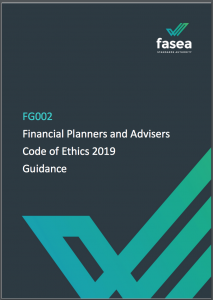- Agree (86%)
- Disagree (11%)
- Not sure (3%)
Strong adviser concern exists around Standard 3 in FASEA’s Code of Ethics.

As we go to print, 83 percent of those voting in our latest poll have expressed their concerns around the FASEA requirement that advisers do not advise, refer or act in any other manner where the adviser has a conflict of interest or duty.
Individuals and groups will be meeting with FASEA from November 12, when the Authority has said it will commence industry consultation. Perhaps the outcome of these sessions, designed according to FASEA to ‘…provide opportunity for consultation on the practical elements of the Code, and to communicate and explain the integrated nature of the Code’, will deliver greater clarity for the adviser.
In the meantime, though, a strict reading of Standard 3 and the guidance notes that accompany it, implies that authorised representatives can no longer be remunerated by life insurance commissions – or if they do, they will be in breach of Standard 3.
One of the statement in the guidance notes applying to Standard 3 reads:
You will breach Standard 3 if a disinterested person, in possession of all the facts, might reasonably conclude that the form of variable income (e.g. brokerage fees, asset based fees or commissions) could induce an adviser to act in a manner inconsistent with the best interests of the client or the other provisions of the Code.
The operative word in this statement is the word ‘could‘. It means that, even if the adviser receiving a variable income is acting in their client’s best interests (which the vast majority of advisers always do), they would still be in breach of Standard 3 because of the possibility they may not.
Both the FPA and AFA have been scathing of the lack of consultation offered by FASEA around its Code of Ethics since the release of its final version in February this year (see: AFA Slams FASEA…, FASEA Criticised for Lack of Consultation). We will continue to monitor and report on developments in relation to this controversial set of standards as the commencement of the long-awaited consultation period approaches – as does the implementation date of the Code itself…




FASEA says from November it will commence Industry consultation.
In plain English.
FASEA has stood in their ivory towers, feathering their own nests and now that there is criticism to their stupidity, they are using tactic number One, “Consultation”
Consultation means, pretend to listen to all the concerns, then still do as you intended.
The UFAA have reacted properly and that is to demand all vested interest members of the FASEA management to be removed and investigated, then prosecuted.
Then demand action to stop the inevitable decline if this continues.
I would suggest that the UFAA are putting up the best form of defence, which is “”Attack””
We are way to far down the track to be questioning, it is time to attack and demand change.
How this incompetent, unethical, clearly conflicted organisation has been allowed to operate and enforce legislation upon advisers who are just trying to earn an honest living by looking after their clients is absolutely and utterly staggering to me. Don Trapnell’s post on the ‘FS Advice’ website recently about the demise of the small business adviser could have included this body of circus clowns quite easily.
You have to be running a charity to not have the conflict of making a living with advice.
Comments are closed.